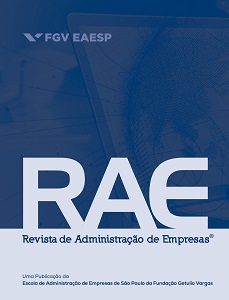Gaslighting: The art of driving minority groups mad at work
Main Article Content
Abstract
This research aims to understand the extent to which gaslighting actions occur in the work environment. To this end, we conducted an empirical survey, in which we visited 37 companies of different sizes, in Rio de Janeiro and São Paulo and interviewed 72 workers of different psychographic traits. These interviews and our field
notes were subjected to Critical Discourse Analysis. We identified two categories a priori, (“racial gaslighting” and “misogynistic gaslighting”), two emerging ones (“LGBTQIAP + -phobic gaslighting” and “instrumental gaslighting”) and built the axial, called “pecuniary
gaslighting”. The field revealed that gaslighting occurs in all types of companies and is a manipulation strategy exercised by heterosexual white men not only on non-hegemonic groups, but against their peers. This study brings as managerial implications and theory, the
discussion and reflection on how discriminatory practices have been naturalized and marginalized, not only in the field of studies, but in the organizational culture.
Downloads
Metrics
Article Details
A RAE compromete-se a contribuir com a proteção dos direitos intelectuais do autor. Nesse sentido:
- adota a licença Creative Commoms BY (CC-BY) em todos os textos que publica, exceto quando houver indicação de específicos detentores dos direitos autorais e patrimoniais;
- adota software de detecção de similaridades;
- adota ações de combate ao plagio e má conduta ética, alinhada às diretrizes do Committee on Publication Ethics (COPE)
References
Abramson, K. (2014). Turning up the lights on gaslighting. Philosophical Perspectives, 28, 1-30. Retrieved from: https://www.jstor.org/stable/26614542
Bourdieu, P. (2010). A dominação masculina (9a ed.). Rio de Janeiro, RJ: Ed. Bertand Brasil.
Calef, V., & Weinshel, E. (1981). Some clinical consequences of introjection: Gaslighting. The Psychoanalytic Quaterly, 50(1), 44-66. doi: 10.1080/21674086.1981.11926942
Carpenter, A. (2018). Gaslighting America. New York, USA: Harper Collins.
Carrigan, T., Connell, B., & Lee, J. (2018). Toward a new sociology of masculinity. In The making of masculinities (pp. 63-100). Routledge.
Connel, R., & Messerschmidt, J. (2013). Masculinidade hegemônica: Repensando o conceito. Revista Estudos Feministas, 21(1), 241-282. doi: 10.1590/S0104-026X2013000100014
Davis, A., & Ernst, R, (2019). Racial gaslighting. Politics, Groups, and Identities, 7(4), 761-774. doi: 10.1080/21565503.2017.1403934
Dijk, T. A. Van. (2011). Discourse and ideology – Discourse studies: A multidisciplinary introduction. New York, USA: Sage.
Fairclough, N. (2013). Critical discourse analysis: The critical study of language. New York, USA: Routledge.
Fordon, K. (2019). Gaslighting. Women’s Studies Quaterly, Vol.47. Feminist Press at the City of New York.
Gomes, R., & Felix, B. (2019). O self no armário: Uma teoria fundamentada sobre o silêncio de gays e de lésbicas no ambiente de trabalho. Cadernos EBAPE.BR, 17(2), 375-388. doi: 0.1590/1679-395174796
Hafermalz, E., & Riemer, K. (2020). Interpersonal connectivity work: Being there with and for geographically distant others. Organization Studies, 41(12), 1627-1648. doi: 10.1177/0170840620973664
Hall, S. (1997). A identidade cultural na pós-modernidade. Rio de Janeiro, RJ: DP&A.
Johnson, V. E., Nadal, K. L., Sissoko, D. R. G., & King, R. (2021). “It’s not in your head”: Gaslighting,‘Splaining, victim blaming, and other harmful reactions to microaggressions. Perspectives on Psychological Science, 16(5), 1024-1036. doi: 10.1177/17456916211011963
Lear, A, & Hale, E. (2020). Gaslighting, brainwashing and ontological crisis in the works of Philip K. Dick. South Atlantic Review, 85(3), 132-151. Retrieved from: link.gale.com/apps/doc/A635785941/AONE?u=anon~65c71399&sid=googleScholar&xid=b7384c35
Neves, M. S. (2008). Identificações subjetivas no discurso sobre avaliação de aprendizagem após um curso de educação continuada. Revista Horizontes, 26, 21-29. Retrieved from: http://lyceumonline.usf.edu.br/webp/portalUSF/itatiba/mestrado/educacao/uploadAddress/Identificacoes%20subjetivas%20no%20discurso[12996].pdf
Paige, S. (2019). The sociology of gaslighting. American Sociological Review, 84(5), 851-875. doi: 10.1177/0003122419874843
Podosky, P. (2021) Gaslighting, first- and second-order. Hypatia, 36(1), 207-227. doi: 10.1017/hyp.2020.54
Pullen, A., Thanem, T., Tyler, M., & Wallenberg, L. (2016). Sexual politics, organizational practices: Interrogating queer theory, work and organization. Gender, Work and Organization, 23(1), 1-6. doi: 10.1111/gwao.12123
Roberts, T., & Andrews, D. C. (2013). A critical race analysis of the gaslighting against African American teachers considerations for recruitment and retention. In D. C. Andrews (Ed.), Contesting the myth of a “post racial” era: The continued significance of race in U.S. Education (Black Studies and Critical Thinking, pp. 69-94). New York, USA: Peter Lang.
Revuz, C. (1998). A língua estrangeira entre o desejo de um outro lugar e o risco do exílio. In I. Signorini (Org.), Língua(gem) e identidade (pp. 213-230). Campinas, SP: Mercado de Letras.
Saraiva, L. A. S., & Irigaray, H. A. D. R. (2009). Políticas de diversidade nas organizações: Uma questão de discurso? RAE-Revista de Administração de Empresas, 49(3), 337-348. doi: 10.1590/S0034-75902009000300008
Searle, J. R. (1969). Speech acts: An essay in the philosophy of language (Vol. 626). Cambridge, UK: Cambridge University Press.
Sinha, G. A. (2020). Lies, gaslighting and propaganda. Buff. L. Rev., 68, 1037.
Spear, A. (2019). Epistemic dimensions of gaslighting: Peer-disagreement, self-trust, and epistemic injustice. Inquiry, 1-24. doi: 10.1080/0020174X.2019.1610051
Stark, C. (2019). Gaslighting, mysogny, and psychological oppression. The Monist, 112, 221-235. doi: 0.1093/monist/onz007
Suskind, D. C. (2020). The psychopath in the corner office: A multigenre. Gender Work Organ., 1-23. doi: 10.1111/gwao.12575
Sweet, P. L. (2019). The sociology of gaslighting. American Sociological Review, 84(5), 851-875. doi: 10.1177/0003122419874843
Tobias, H., & Joseph, A. (2020). Sustaining systemic racism through psychological gaslighting: Denials of racial profiling and justifications of carding by police utilizing local news media. Race and Justice, 10(4), 424-455. doi:10.1177/2153368718760969







